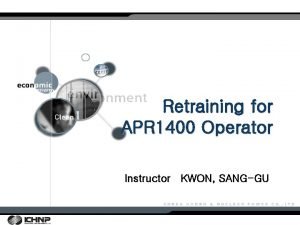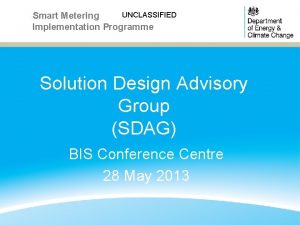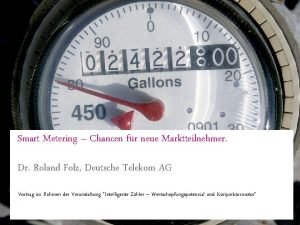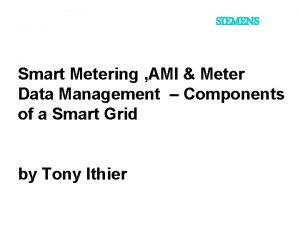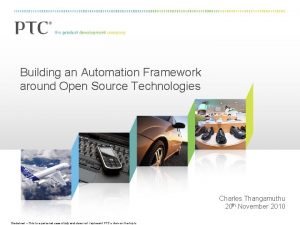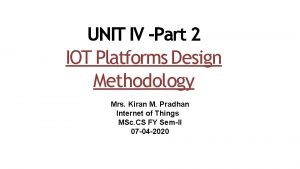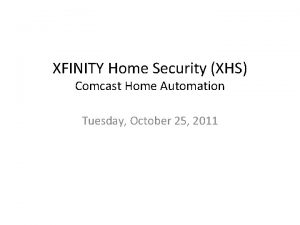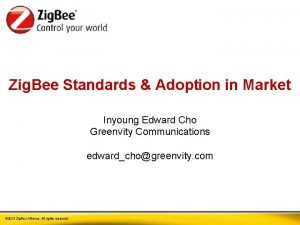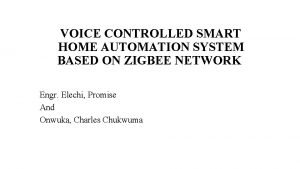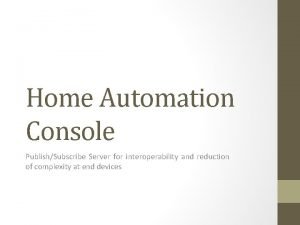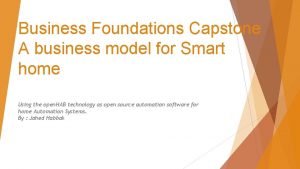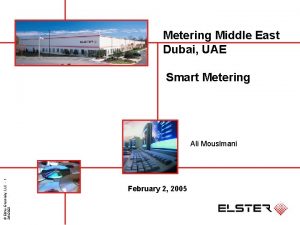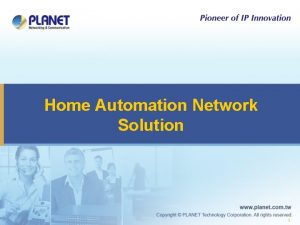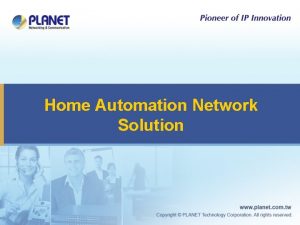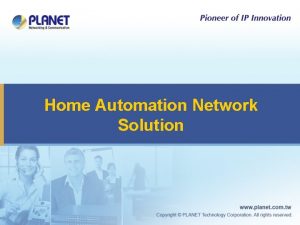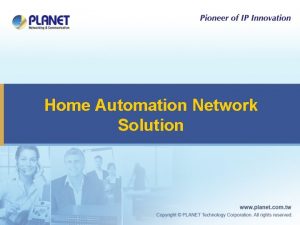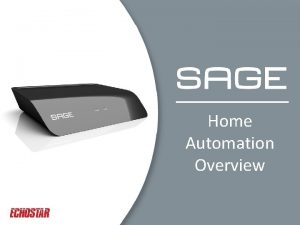Smart Metering Home Automation Technologies ReTraining for Electricians













- Slides: 13

Smart Metering & Home Automation Technologies Re-Training for Electricians

About Project SMARTEL Project Results The adoption of energy efficiency measures is shifting the building installation industry towards green technologies bringing changes on workplace requirements in training. The SMARTEL project increased the quality of VET provision for electricians and in this way: v matched electricians’ competence and skills with Smart Metering and Home Automation needs v promoted employability and mobility within the sector v made available online educational resources including new and validated training materials, guidelines, etc. Partnership

VET learning outcomes Data for current and future training requirements for up-skilling electricians in Smart Metering and Home Automation collected by country partners, analyzed and systemized for the aims of the elaboration of the learning units. Six separate Learning Units comprise a unique set of learning outcomes translated in the partners’ country languages. These include knowledge, skills and competences for EE installations, programming of energy saving electrical devices, home automation protocols, etc. and are ready for use by all VET providers in the sector.

Learning Units: Learning Unit 1 What is a home automation? Here trainees will learn about: v Areas of application of the home automation v Internet and remote access to the system v Applications of the actuators in domotic installations v What is node, digital and analog signals etc. v Learning Unit 2 Energy Control The solved issues here are: v HVAC systems management and adaptation of the room temperature v How to save water, fuel, electricity, etc. by home automation Data Bus System v Manage the disconnection of non-priority circuits v Home automation in different rooms v Maintenance of the energy control systems v Integration with other housing services v Energy savings from lightening v Water and/or gas leaks detections etc.

Learning Units: Learning Unit 4 Sensors and Actuators Learning Unit 3 Networks of smart controlling systems? The topic includes: This unit is about: v Types of networks – personal networks, wireless networks for remote distance etc. v v Topologies of networks Types of sensors – digital, analog, magnetic v Network transmission media v Manual control sensors – pushbuttons and switches v Fiber-optic cables Wireless media v v Detectors for smoke, heat, natural gas, flood, brightness etc. v Communication models v Room thermostats v Cloud and Fog Computing v v Intelligent devices networks – Io. T and KNX protocols, En. Ocean networks etc. Connection of sensors to the domotic node inputs etc. v Dimmers

Learning Units: Learning Unit 5 Programming and installation of smart devices Learning Unit 6 User interface for building control The topic includes: v Introduction, types and scalability of the user interface How to understand the programming of building automation v User interface software and WEB networks v User Interface visual and control elements v The software and smart device communication adapters for buildings v Selection of the measurement and controlling devices according to the type of communication; v Communication standards for automated buildings v Data collection and storage, trend registration, interpretation and transfer to the user interface; v Programming in traditional languages v v Evaluation of the system being automated High level interfaces and their integration with other building systems Individual and centralized control algorithms etc. v v Distributed Building Control Networks v Alarms and Alarm Management v Block programming v Upgrades and Retrofits The content of the unit includes: v Software systems in the automation of buildings v

SMARTEL Massive Open Online Course (MOOC) in Smart Metering and Home Automation systems and services for electricians The online course includes a comprehensive training program for smart metering and home automation technology that help electricians to improve their efficiency and productivity by responding to the current and emerging workplace requirements. At the end and within the learning units there are tasks, questions and tests that are designed to facilitate the understanding of what is being learned. Using working instructional solutions, along with incoming data from the other learners (if any), everyone will be able to evaluate their own work by themselves. Tasks are for understanding and development, not for evaluation. It is recommended the students to discuss their work among themselves - before, during and after the self-assessment process. Free education certificates are not offered in this course. Students will receive badges upon successful completion of all activities. Badges serve as evidence of professional development and skills acquisition but do not constitute official certification

Information for the online course. . . Duration of the training - 6 weeks Spending time within each week - from 5 to 15 hours Working languages – Bulgarian, Greek, Lithuanian, English and Spanish. Level according to the European framework (EQF level) – 5 Within the course each student will learn and be able to: ü Identify technical issues related to the installation of intelligent metering and intelligent devices and home automation technologies in new and existing buildings ü Understand how IT and network infrastructures work and connect to smart devices ü Acquire the necessary digital and technical skills to integrate intelligent metering and home automation technologies into buildings ü Know the national and European legislation on the installation of smart meters in buildings ü Interact with customers to ensure that the home automation system is selected and used effectively ü Install and control the installation of smart metering and home automation technologies

Information for the online course. . . The MOOC is based on the 6 learning units and assessment tools produced by the partnership, contextualized resources and assessment materials and hosts the Open Educational Resources for multiplication, contextualization and exploitation by VET providers. A 3 -week pilot session of the course took place in the end of 2018 year, for interaction with peers and facilitators and assessment of the training materials. Now the online course is absolutely ready for using from all stakeholders and professionals in the field of smart metering and home automation! For more information please visit the following link: https: //www. openlearning. com/courses/smartel-mooc-bg-version-/homepage

Information for the online course. . . https: //www. openlearning. com/courses/smartel-mooc/Home. Page

Information for the online course. . . https: //www. openlearning. com/courses/smartel-mooc/Home. Page

Implemented Activities, Outputs and Events Validation, Validation endorsement and mutual recognition of the SMARTEL units of learning outcomes by field stakeholders 2 organized demonstration workshops in Lithuania and Spain 3 national information days in France, Greece and Bulgaria 5 direct email campaigns. More than 8 000 visitors on SMARTEL webpage.

Additional information about the project Visit our website: http: //smartel-project. eu
 What personality traits do electricians have
What personality traits do electricians have Operator retraining program
Operator retraining program What is attribution retraining in sport
What is attribution retraining in sport Decc smart metering implementation programme
Decc smart metering implementation programme Smart metering telekom
Smart metering telekom Siemens smart meters
Siemens smart meters Automation source technologies
Automation source technologies Automation source technologies
Automation source technologies Explain iot design methodology
Explain iot design methodology Xfinity home subscriber portal
Xfinity home subscriber portal Bee
Bee Smart home conclusion
Smart home conclusion Problem statement for home automation using arduino
Problem statement for home automation using arduino Wharton business foundations capstone
Wharton business foundations capstone

